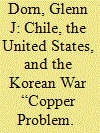|
|
|
Sort Order |
|
|
|
Items / Page
|
|
|
|
|
|
|
| Srl | Item |
| 1 |
ID:
193502


|
|
|
|
|
| Summary/Abstract |
On May 2, 1952, Chilean President Gabriel González Videla, a staunch U.S. ally, suddenly terminated the Washington Agreement governing the sale of copper to the United States, in effect, imposing an embargo and nationalizing the export of copper in the midst of the Korean War. For U.S defense planners, who had based their mobilization and rearmament program upon the strict control of copper, steel, and aluminum, the metals that enabled them to “control practically all production” in the nation, this was an unexpected and dangerous blow. “The loss that we would sustain by not having access to Chilean copper would be irreparable,” the head of the National Production Administration (NPA) Copper Division warned, “as there is no conceivable way whereby we could meet current programs.”1 Although it was always clear that the embargo was a negotiating tool rather than a belligerent act, subsequent threats to sell copper across the Iron Curtain and nationalize the mines lent the move additional gravity. This “copper problem” only ended when González Videla’s successor, Carlos Ibañez del Campo, under U.S. pressure, enacted a new copper law, the Nuevo Trato (“New Deal”), in 1955. The Nuevo Trato represented a triumph for rightists in Chilean politics, the failure of Chilean efforts to challenge the U.S. government and copper companies, and a temporary lull in efforts to exert control over Chile’s most critical industry.
|
|
|
|
|
|
|
|
|
|
|
|
|
|
|
|
| 2 |
ID:
102942


|
|
|
|
|
| Publication |
2011.
|
| Summary/Abstract |
This work examines U.S-Bolivian relations in the years leading up to Víctor Paz Estenssoro's National Revolution in 1952. Harry S. Truman's diplomats and national security planners sought to secure scarce tin for stockpiling and domestic consumption during the early Cold War, but unintentionally helped to destabilize three pro-U.S. Bolivian governments. U.S. efforts to drive down the price of tin, led by Reconstruction Finance Corporation (RFC) chief Stuart Symington and Senator Lyndon B. Johnson but often opposed by the State Department, exacerbated Bolivian economic problems and created a climate in which Paz Estenssoro and his Movimiento Nacionalista Revolucionario could flourish. Although Truman did eventually intervene personally to resolve the standoff between the RFC and the Bolivians in the days before the National Revolution, he acted too late to avert one of the most significant Latin American social revolutions of the twentieth century.
|
|
|
|
|
|
|
|
|
|
|
|
|
|
|
|
|
|
|
|
|